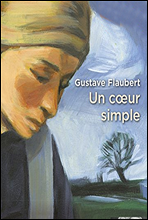
순박한 마음 (Un coeur simple) 프랑스어 문학 시리즈 049
- 저자귀스타브 플로베르 (Gustave Flaubert) 저
- 출판사유페이퍼
- 출판일2016-10-13
- 등록일2017-07-18
- SNS공유


- 파일포맷EPUB
- 파일크기307KB
- 공급사YES24
-
지원기기
PC
PHONE
TABLET
프로그램 수동설치
전자책 프로그램 수동설치 안내
아이폰, 아이패드, 안드로이드폰, 태블릿,
보유 10, 대출 0,
예약 0, 누적대출 16, 누적예약 0
책소개
- 프랑스어로 제작된 전자책입니다. - 시골 부르주아의 집에서 하녀로 일하는 펠리시테Felicite가 주인공이다- 역주) 의 끝부분과 마찬가지로, 가톨릭의 성체 안치소에 당당히 자리 잡고 있는 얼빠진... "A Simple Heart", or Un cœur simple or Le perroquet in French, is a story about a servant girl named Felicite. After her one and only love Theodore purportedly marries a well-to-do woman to avoid conscription, Felicite quits the farm where she works and heads for Pont-l'Eveque, where she picks up work in a widow's house as a servant. She is very loyal, and easily lends her affections to the two children of her mistress, Mme Aubain. She gives entirely to others; although many take advantage of her, she is unaffected. She has no husband, no children, and no property, and is reliant on her mistress to keep her; she is uneducated, which bars her visits to the Church; her death is virtually unnoticed. Despite her life being seemingly pointless, she has within her the power to love, which she does even when she does not receive it in return. She also carries within her a yearning, a majestic quasi-religious sensibility which finds its apotheosis in the deification, as she dies, of her pet parrot who floats above her deathbed masquerading as the Holy Ghost. She lives a simple, unexamined life.(워키피아)목차
작품 설명■ Un coeur simple
I
II
III
IV
V
작가 소개
판권 페이지
















